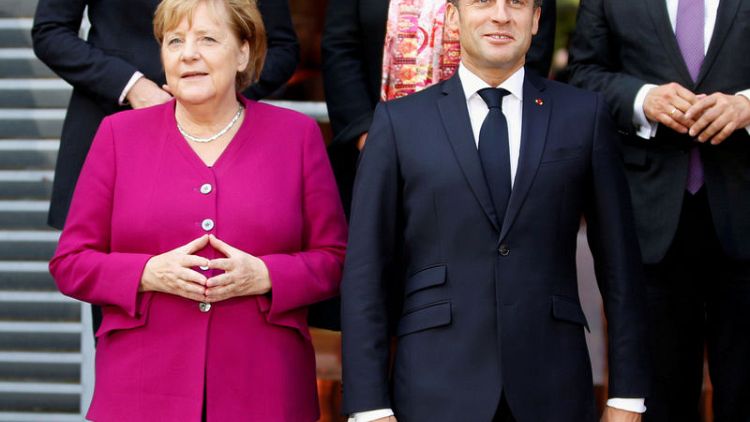By Luke Baker and Andreas Rinke
LONDON/BERLIN (Reuters) - France and Germany have been at loggerheads in recent weeks, with differences over NATO and the future of Europe prompting some commentators to conclude that the two nations underpinning European unity are fundamentally split.
But away from the headlines, steady work continues that suggests they are not as far apart as sometimes appears, at least on foreign and security policy, even if the chances of a bold new Franco-German understanding remain remote.
While there are vast contrasts in style and at times substance between Emmanuel Macron, 41, a hard-charging first-time president, and Angela Merkel, 65, a consensus-building fourth-time chancellor, both are acutely aware that the need to reach a Paris-Berlin consensus tends to trump all else.
"The situation is not as tense or ruptured as some have stated," said Francois Heisbourg, a senior advisor on Europe at the International Institute for Strategic Studies and a former senior official in the French foreign and defence ministries.
"The French do understand that the German government is currently in a state of paralysis, which means the ability of Germany to take substantive new initiatives or to respond to French initiatives is very limited."
In June 2018, Merkel and Macron met outside Berlin and agreed the Meseberg declaration, a series of commitments on issues from security and defence policy to migration, economic policy, climate and a eurozone budget.
On foreign policy and defence, Paris and Berlin are pushing ahead on a European Intervention Initiative, will host talks next month between Kiev and Moscow in an effort to end the conflict in Ukraine, and are exploring ways of making EU foreign-policy decision-making more effective, including a possible U.N.-style European Security Council. They also agree on joint fighter planes and tank development.
Macron and Merkel will meet next week at a gathering of NATO's 29 heads of government outside London.
While the agenda may be dominated by the French president's criticism of the alliance as "brain dead", it equally will be an opportunity for the two leaders to clear the air and talk up how closer coordination among Britain, France and Germany can bolster both European security and NATO.
"Whether Britain is in the EU or not, there is a clear recognition in Paris and Berlin that Britain has a key role to play in European security, under the umbrella of NATO and otherwise. There is a lot of focus on making that happen," said a British official involved in the discussions.
CAUTIOUS MERKEL
Since coming to power in May 2017, Macron has chaffed at German foot-dragging. Merkel, who must always weigh the demands of her ruling coalition, has been unable to match the French president's zeal for sweeping reform on issues ranging from a eurozone budget to changes to EU enlargement policy.
Merkel's term is up in 2021, but she shows little inclination to pursue grand legacy policies. Her putative successor, Annegret Kramp-Karrenbauer, is similarly restrained by Germany's consensus politics.
Hence the impatience on the part of Macron, who wants to move fast while also conscious that even if he is reelected in 2022, time is limited to achieve his vision, which will still require German buy-in.
"German-French cooperation is like two sides of an accordion, sometimes you pull it apart a bit, then both sides are coming back together again," said a German diplomat.
"They know that they are fixed to each other. And they know that they can only produce a nice sound together."
Germany holds the rotating presidency of the EU in the second half of 2020 and is already coordinating with Paris on ensuring consistency between that period and France's presidency in the first half of 2022.
(Writing by Luke Baker; Editing by Frances Kerry)
